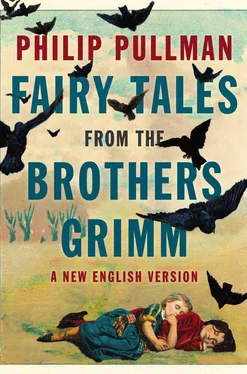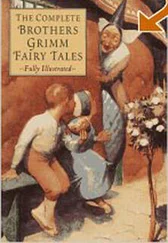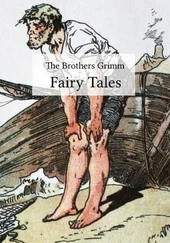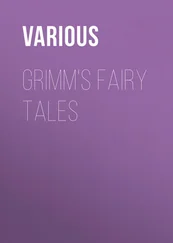A priest was summoned to say a mass for his soul, and the villagers left the two of them alone while that was being done. Luckily, Farmerkin recognized the priest.
‘I got you out of that cupboard,’ he said, ‘now you get me out of this barrel.’
‘Well, I wish I could—’
‘Just back me up, that’s all,’ said Farmerkin.
He’d seen a shepherd coming along the road with his flock of sheep. He happened to know that that shepherd wanted one thing more than anything else, and that was to be mayor.
So Farmerkin shouted at the top of his voice: ‘No, I won’t do it! The whole world can ask me to, but I won’t! I refuse!’
The shepherd stopped and said, ‘What’s going on? What won’t you do?’
‘They want me to be mayor,’ said Farmerkin, ‘and they said all I got to do is get in the barrel, but I won’t do it. I just won’t.’
‘Serious?’ said the shepherd. ‘The only thing you got to do to be mayor is get in the barrel?’
Farmerkin nudged the priest, who said, ‘Yes, that’s right.’
‘Oh, well, if that’s all it takes,’ said the shepherd, and he clambered in. Farmerkin put the lid on, and then took the shepherd’s crook and drove the flock of sheep away.
The priest went to the village council and told them that the mass had been said, and the barrel was ready. The mayor led them out, and they all came hurrying along and rolled the barrel towards the pond.
As it bumped along the road, the shepherd shouted out, ‘I’ll be glad to be mayor!’
They thought it was Farmerkin shouting, of course, and called back, ‘Course you will! But first you can have a look round down there!’
Then they rolled the barrel into the water, and set off for home. While the priest stayed behind, pulled up his cassock and tried to drag the barrel out so the shepherd wouldn’t drown, the villagers had the surprise of their lives, because as they came into the village square, there was Farmerkin with a flock of sheep.
‘Farmerkin! What the devil are you doing here? How’d you escape from the barrel?’
‘Nothing to it,’ he said. ‘The barrel sank deeper and deeper till it got to the bottom, and then I kicked the end open and crawled out. And you’ve never seen such beautiful meadows as they’ve got down there! Rich green grass, warm sunshine and so many lambs you couldn’t count. So I rounded up a handful and brought them back up with me.’
‘Are there any left?’
‘Oh, plenty. More than enough for everyone.’
So they all turned around and hurried back to the pond, each of them determined to bring back a flock of his own. Just then the sky happened to be full of those fleecy little white clouds that people call lambkins, and the villagers were so excited seeing the reflection of the clouds in the pond that they didn’t notice the soaking wet shepherd on the other side belabouring the priest. All they could do was exclaim in delight at the clouds and jostle for position on the bank.
‘Me first,’ said the mayor, and plunged in with a splash.
There came a gurgle from the water as he went down, and thinking that he was calling for them all to join him, they jumped in after him.
After that there was no one left in the village, so Farmerkin found himself in charge of everything. He gave the shepherd his sheep back, declared himself mayor and became a rich man.
* * *
Tale type:AT 1535, ‘The Rich Peasant and the Poor Peasant’, including an episode of type 1737, ‘Trading Places with the Trickster in a Sack’
Source:stories told to the Grimm brothers by the Hassenpflug family and Dorothea Viehmann
Similar stories:Alexander Afanasyev: ‘The Precious Hide’ ( Russian Fairy Tales ); Katharine M. Briggs: ‘Jack and the Giants’, ‘Sheep for the Asking’ ( Folk Tales of Britain )
Farmerkin is a classic trickster. Quick wits and impudence are what you need to play that part, but a plentiful supply of dupes is also necessary. There was clearly no shortage of them in his village.
But how severely should dupes be punished for being dim-witted? It seems fair enough for the villagers who wanted Farmerkin dead to be drowned themselves, because it comes about as a direct result of their greed, but it’s a bit rough on the shepherd, who has never wished Farmerkin any harm. In the original the shepherd is drowned, and what’s more the priest gets away scot-free, which also doesn’t feel right. In this version I have the priest rescue the shepherd and then get belaboured for his pains, which seems a bit more just all round.
Priests don’t turn up very often in Grimm, but when they do, their function as often as not seems to be to get up to mischief with another man’s wife. In the tale ‘Old Hildebrand’, for instance, there is a priest who tricks a peasant into going to Italy so that he and the peasant’s wife can have a fine time together. He’s caught out and walloped in the end, and quite right too.
Once there was a king whose golden-haired wife was so lovely that her equal couldn’t be found anywhere in the world.
It so happened that she fell ill, and feeling that she was about to die, she said to the king, ‘If you marry again when I’m dead, you mustn’t marry anyone less beautiful than me, or with hair less golden than mine. You must promise me.’
The king gave his promise, and soon afterwards she closed her eyes and died.
For a long time the king was inconsolable, and couldn’t even think about taking a second wife. But eventually his councillors said, ‘Your majesty, there’s no getting away from it: the country needs a queen. You must marry again.’
So messengers were sent out far and wide to look for a bride as beautiful as the queen had been. However, they had no success, no matter how far they looked. Besides, even if they had found someone as beautiful, she might not have had golden hair. The messengers came home empty-handed.
Now the king had a daughter whose hair was as golden as her mother’s had been, and who gave every promise of being as beautiful. During her childhood the king hadn’t noticed it, but one day soon after she came of age he happened to see her as the sun shone through the window on her golden hair. Suddenly he saw that she was as beautiful as her mother had been, and he fell passionately in love with her on the spot.
He summoned the privy council and announced, ‘I have found a bride at last. There is no one in the nation as beautiful as my daughter, so I have determined to marry her.’
The councillors were appalled.
‘Your majesty, this is impossible! The Lord God has forbidden any such thing! It is one of the very worst sins. No good could ever come of it, and the nation would fall into ruin!’
As for the girl, she was horrified. Hoping to gain a little time, she said, ‘Dear father, before I marry you, I’ll need three dresses: one as gold as the sun, one as silver as the moon and one that glitters like the stars. And what’s more I must have a cloak made of a thousand different kinds of fur — one for every different kind of animal in the kingdom.’
She thought that would be impossible, and it would keep him from carrying out his wicked plan. But the king was so mad with love that nothing would stop him. He engaged the most skilful weavers in the land to weave three kinds of cloth, and the finest designers to cut it and sew it into three magnificent dresses. Meanwhile he set his huntsmen to work in the forest, and day after day they came home with their trophies of fur and skin. The best workers in leather and fur cut a thousand different pieces and sewed them together, and before long it was clear to the girl that her father was going to supply everything she’d asked for.
Читать дальше












